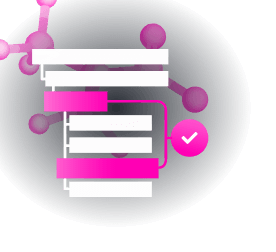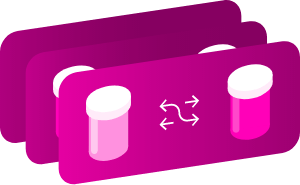Explore a selection of our essential drug information below, or:
Identification
- Summary
Brexucabtagene autoleucel is a modified autologous chimeric antigen receptor (CAR) T cell therapy employing a modified murine anti-CD19 single-chain variable fragment linked to CD28 and CD3ζ co-stimulatory domains for the treatment of patients with relapsed and refractory mantle cell lymphoma.
- Brand Names
- Tecartus
- Generic Name
- Brexucabtagene autoleucel
- DrugBank Accession Number
- DB15699
- Background
Mantle cell lymphoma is a heterogeneous sub-category of non-Hodgkin's lymphoma that can be classified as either an aggressive nodal or an indolent leukemic non-nodal variant. Despite the introduction of Bruton's tyrosine kinase (BTK) inhibitors such as ibrutinib and acalabrutinib, the prognosis for MCL patients remains poor and those that relapse following BTK inhibitor therapy have few treatment options.2,3
More recently, chimeric antigen receptor (CAR) T cell therapies have been developed that modify a patient's own T cells using viral transduction to bind to and destroy cancerous cells. These therapies differ in manufacturing methodology, viral vector, chimeric antigen choice, and the internal co-stimulatory domains of the chimeric antigen.6 Similar to axicabtagene ciloleucel, brexucabtagene autoleucel employs a murine anti-CD19 single-chain variable fragment (scFv) linked to internal CD28- and CD3ζ-derived co-stimulatory domains.1,4,7 However, the preparation of brexucabtagene autoleucel, previously referred to as KTE-X19, uses a method of T cell enrichment that decreases the prevalence of CD19-expressing tumour cells in the CAR T cell preparation.7
Brexucabtagene autoleucel was granted accelerated approval for the treatment of relapsed and refractory MCL by the FDA on July 24, 2020, and is currently available through Kite Pharma Inc. under the tradename TECARTUS.7
- Type
- Biotech
- Groups
- Approved
- Biologic Classification
- Cell transplant therapies
Autologous cell transplant - Synonyms
- Brexucabtagene autoleucel
- External IDs
- KTE X19
- KTE-X19
Pharmacology
- Indication
Brexucabtagene autoleucel is a modified autologous chimeric antigen receptor (CAR) T cell immunotherapy indicated for the treatment of relapsed or refractory mantle cell lymphoma (MCL) in adult patients.7 It is additionally indicated for the treatment of adults with relapsed or refractory B-cell precursor acute lymphoblastic leukemia (ALL).7
Brexucabtagene autoleucel has been granted accelerated approval based on results from a single-arm, open-label, multicentre clinical trial; continued approval may be contingent on confirmatory trials.7
 Reduce drug development failure ratesBuild, train, & validate machine-learning modelswith evidence-based and structured datasets.Build, train, & validate predictive machine-learning models with structured datasets.
Reduce drug development failure ratesBuild, train, & validate machine-learning modelswith evidence-based and structured datasets.Build, train, & validate predictive machine-learning models with structured datasets.- Associated Conditions
Indication Type Indication Combined Product Details Approval Level Age Group Patient Characteristics Dose Form Treatment of Refractory mantle cell lymphoma •••••••••••• ••••• •••••••••• Treatment of Relapsed mantle cell lymphoma •••••••••••• ••••• •••••••••• Treatment of Refractory b-cell precursor acute lymphoblastic leukemia •••••••••••• ••••• •••••••••• Treatment of Relapsed b cell precursor acute lymphoblastic leukemia •••••••••••• ••••• •••••••••• - Contraindications & Blackbox Warnings
 Prevent Adverse Drug Events TodayTap into our Clinical API for life-saving information on contraindications & blackbox warnings, population restrictions, harmful risks, & more.Avoid life-threatening adverse drug events with our Clinical API
Prevent Adverse Drug Events TodayTap into our Clinical API for life-saving information on contraindications & blackbox warnings, population restrictions, harmful risks, & more.Avoid life-threatening adverse drug events with our Clinical API- Pharmacodynamics
Brexucabtagene autoleucel is an autologous T cell immunotherapy employing a CD19-directed chimeric antigen receptor (CAR) to direct modified T cells to bind to and subsequently destroy cancerous B cells.7 Like other CAR T cell therapies, brexucabtagene autoleucel has a durable response; in the single-arm ZUMA-2 trial, the median time to peak CAR T cell levels was 15 days, and 60% of assayed patients had detectable levels of CAR T cells at 24 months following the single infusion.1
As brexucabtagene autoleucel recognizes both normal and cancerous B cells, adverse effects related to B cell depletion are expected, including severe and prolonged cytopenia, severe infections, neurological effects, hypogammaglobulinemia, and the potential to develop secondary malignancies. Patients should be advised not to drive or operate heavy machinery for eight weeks following infusion. Hypersensitivity reactions may occur during infusion.7
- Mechanism of action
Mantle cell lymphoma (MCL) is a heterogeneous sub-category of B cell non-Hodgkin's lymphoma typified by overexpression of cyclin D1 and SOX-11 as well as mutations in numerous genes including TP53; overall, these changes lead to increased cell growth, apoptosis inhibition, and cell-adhesion-mediated drug resistance.2,3 Based on the 2016 World Health Organization guidelines, MCL can be generally subdivided into aggressive nodal and indolent leukemic non-nodal subtypes.2,3 Bruton's tyrosine kinase (BTK) inhibitors can be used following a relapse of front-line therapy, but patients who relapse after BTK inhibitor therapy have a poor prognosis.1
Chimeric antigen receptors (CARs) are synthetic immunoreceptors that can be introduced into T cells ex vivo using viral transduction and that allow for major histocompatibility complex (MHC)-independent direction of T cells to any cell possessing the complementary antigen.4 Brexucabtagene autoleucel employs a murine anti-CD19 single-chain variable fragment (scFv) linked to internal CD28- and CD3ζ-derived co-stimulatory domains.7 Brexucabtagene autoleucel is prepared from the patient's own peripheral blood mononuclear cells using a leukapheresis methodology that excludes CD19-expressing tumour cells to avoid potential activation and exhaustion of CAR T cells during manufacturing.1 Collected cells are activated with anti-CD3 and anti-CD28 antibodies along with IL-2, transduced with a replication-incompetent retroviral vector, and subsequently expanded prior to infusion.7
Once infused into the patient, the CAR T cells bind to CD19 antigens on the surface of both normal and cancerous B cells, leading to CAR T cell activation and expansion. Activated CAR T cells secrete cytokines and chemokines including, but not limited to, IL-6, IL-8, IL-10, IL-15, TNF-α, IFN-γ, and soluble IL-2 (sIL2Rα), leading to tumour cell lysis and anti-tumour activity.5,7
Target Actions Organism AB-lymphocyte antigen CD19 binderHumans - Absorption
Patients in the ZUMA-2 clinical trial received a target dose of 2 x 106 CAR T cells/kg, which expanded to a variable degree among responders and non-responders; peak levels were reached within the first seven to 15 days following infusion.1,7 Median peak CAR T cell levels were 102.4 cells/μL (range 0.2 to 2589.5) in responders and 12.0 cells/μL (range 0.2 to 1354.0) in non-responders. The corresponding median AUC0-28 for responders and non-responders was 1487.0 cells/μL*day (range 3.8 to 2.77E+04) and 169.5 cells/μL*day (range 1.8 to 1.17E+04), respectively.7
These values were also assessed based on the co-administration of immunosuppressive therapy. Patients receiving neither corticosteroids nor tocilizumab had a peak of 24.7 cells/μL with an AUC0-28 of 360.4 cells/μL*day, patients receiving only corticosteroids had a peak of 24.2 cells/μL and an AUC0-28 of 367.8 cells/μL*day, and patients receiving only tocilizumab had a peak of 86.5 cells/μL and an AUC0-28 of 1188.9 cells/μL*day. The highest counts were in patients receiving both corticosteroids and tocilizumab, with a peak of 167.2 cells/μL and an AUC0-28 of 1996.0 cells/μL*day.7
Finally, separating patients into those < 65 years of age of ≥ 65 years of age, patients in the lower age group had a median peak of 112.5 cells/μL and a median AUC0-28 of 1640.2 cells/μL*day. Older patients had a median peak count of 74.1 cells/μL and a median AUC0-28 of 876.5 cells/μL*day.7
- Volume of distribution
Not Available
- Protein binding
Not Available
- Metabolism
- Not Available
- Route of elimination
Not Available
- Half-life
Not Available
- Clearance
Not Available
- Adverse Effects
 Improve decision support & research outcomesWith structured adverse effects data, including: blackbox warnings, adverse reactions, warning & precautions, & incidence rates. View sample adverse effects data in our new Data Library!Improve decision support & research outcomes with our structured adverse effects data.
Improve decision support & research outcomesWith structured adverse effects data, including: blackbox warnings, adverse reactions, warning & precautions, & incidence rates. View sample adverse effects data in our new Data Library!Improve decision support & research outcomes with our structured adverse effects data.- Toxicity
Toxicity information regarding brexucabtagene autoleucel is not readily available. Patients experiencing an overdose are at an increased risk of severe adverse effects such as severe infections, severe and prolonged cytopenia, hypogammaglobulinemia, cytokine release syndrome, and neurological toxicities.6,7 Symptomatic and supportive measures are recommended.
- Pathways
- Not Available
- Pharmacogenomic Effects/ADRs
- Not Available
Interactions
- Drug Interactions
- This information should not be interpreted without the help of a healthcare provider. If you believe you are experiencing an interaction, contact a healthcare provider immediately. The absence of an interaction does not necessarily mean no interactions exist.
Drug Interaction Integrate drug-drug
interactions in your softwareAmbroxol The risk or severity of methemoglobinemia can be increased when Brexucabtagene autoleucel is combined with Ambroxol. Articaine The risk or severity of methemoglobinemia can be increased when Brexucabtagene autoleucel is combined with Articaine. Benzocaine The risk or severity of methemoglobinemia can be increased when Brexucabtagene autoleucel is combined with Benzocaine. Benzyl alcohol The risk or severity of methemoglobinemia can be increased when Brexucabtagene autoleucel is combined with Benzyl alcohol. Bupivacaine The risk or severity of methemoglobinemia can be increased when Brexucabtagene autoleucel is combined with Bupivacaine. - Food Interactions
- No interactions found.
Products
 Drug product information from 10+ global regionsOur datasets provide approved product information including:dosage, form, labeller, route of administration, and marketing period.Access drug product information from over 10 global regions.
Drug product information from 10+ global regionsOur datasets provide approved product information including:dosage, form, labeller, route of administration, and marketing period.Access drug product information from over 10 global regions.- Brand Name Prescription Products
Name Dosage Strength Route Labeller Marketing Start Marketing End Region Image Tecartus Suspension 1000000 1/68mL Intravenous Kite Pharma, Inc. 2021-10-01 Not applicable US Tecartus Suspension 100000000 cells / bag Intravenous Gilead Sciences 2023-12-15 Not applicable Canada Tecartus Suspension 2000000 1/68mL Intravenous Kite Pharma, Inc. 2020-07-24 Not applicable US Tecartus Suspension 200000000 cells / bag Intravenous Gilead Sciences 2021-12-16 Not applicable Canada Tecartus Suspension 120000000 cells Intravenous Kite Pharma Eu B.V. 2021-03-17 Not applicable EU
Categories
- ATC Codes
- L01XL06 — Brexucabtagene autoleucel
- Drug Categories
- Amino Acids, Peptides, and Proteins
- Antineoplastic Agents
- Antineoplastic Agents, Immunological
- Antineoplastic and Immunomodulating Agents
- Antineoplastic cell and gene therapy
- Cancer immunotherapy
- CD19-Directed Genetically Modified Autologous T-cell Immunotherapies
- Immunization
- Immunization, Passive
- Immunologic Techniques
- Immunomodulation
- Immunotherapy
- Investigative Techniques
- Membrane Proteins
- Proteins
- Receptors, Antigen
- Receptors, Antigen, T-Cell
- Receptors, Artificial
- Receptors, Cytoplasmic and Nuclear
- Classification
- Not classified
- Affected organisms
- Humans and other mammals
Chemical Identifiers
- UNII
- 4MD2J2T8SJ
- CAS number
- Not Available
References
- Synthesis Reference
Arianne Perez, Stuart A. Sievers, Ruben Alvarez Rodriguez, and Jonathan Belk. "Chimeric antigen receptors and CAR-T cells and methods of use." U.S. Patent US2019065776, issued June 18, 2020.
- General References
- Wang M, Munoz J, Goy A, Locke FL, Jacobson CA, Hill BT, Timmerman JM, Holmes H, Jaglowski S, Flinn IW, McSweeney PA, Miklos DB, Pagel JM, Kersten MJ, Milpied N, Fung H, Topp MS, Houot R, Beitinjaneh A, Peng W, Zheng L, Rossi JM, Jain RK, Rao AV, Reagan PM: KTE-X19 CAR T-Cell Therapy in Relapsed or Refractory Mantle-Cell Lymphoma. N Engl J Med. 2020 Apr 2;382(14):1331-1342. doi: 10.1056/NEJMoa1914347. [Article]
- Jain P, Wang M: Mantle cell lymphoma: 2019 update on the diagnosis, pathogenesis, prognostication, and management. Am J Hematol. 2019 Jun;94(6):710-725. doi: 10.1002/ajh.25487. Epub 2019 Apr 19. [Article]
- Maddocks K: Update on mantle cell lymphoma. Blood. 2018 Oct 18;132(16):1647-1656. doi: 10.1182/blood-2018-03-791392. Epub 2018 Aug 28. [Article]
- Roberts ZJ, Better M, Bot A, Roberts MR, Ribas A: Axicabtagene ciloleucel, a first-in-class CAR T cell therapy for aggressive NHL. Leuk Lymphoma. 2018 Aug;59(8):1785-1796. doi: 10.1080/10428194.2017.1387905. Epub 2017 Oct 23. [Article]
- Jain MD, Bachmeier CA, Phuoc VH, Chavez JC: Axicabtagene ciloleucel (KTE-C19), an anti-CD19 CAR T therapy for the treatment of relapsed/refractory aggressive B-cell non-Hodgkin's lymphoma. Ther Clin Risk Manag. 2018 May 31;14:1007-1017. doi: 10.2147/TCRM.S145039. eCollection 2018. [Article]
- Brudno JN, Kochenderfer JN: Recent advances in CAR T-cell toxicity: Mechanisms, manifestations and management. Blood Rev. 2019 Mar;34:45-55. doi: 10.1016/j.blre.2018.11.002. Epub 2018 Nov 14. [Article]
- FDA Approved Drug Products: Tecartus (brexucabtagene autoleucel) suspension [Link]
- External Links
- 2387277
- Wikipedia
- Brexucabtagene_autoleucel
Clinical Trials
- Clinical Trials
Clinical Trial & Rare Diseases Add-on Data Package
Explore 4,000+ rare diseases, orphan drugs & condition pairs, clinical trial why stopped data, & more. Preview package Phase Status Purpose Conditions Count Start Date Why Stopped 100+ additional columns Unlock 175K+ rows when you subscribe.View sample data2 Active Not Recruiting Treatment Relapsed / Refractory Mantle Cell Lymphoma (MCL) 1 somestatus stop reason just information to hide 2 Completed Treatment Relapsed / Refractory Mantle Cell Lymphoma (MCL) 1 somestatus stop reason just information to hide 2 Enrolling by Invitation Other Solid and Hematological Malignancies 1 somestatus stop reason just information to hide 2 Recruiting Treatment Acute Lymphoblastic Leukemia (ALL) / B-Cell Lymphoblastic Leukemia 1 somestatus stop reason just information to hide 2 Recruiting Treatment B-Cell Lymphoma 1 somestatus stop reason just information to hide
Pharmacoeconomics
- Manufacturers
- Not Available
- Packagers
- Not Available
- Dosage Forms
Form Route Strength Suspension Intravenous 1000000 1/68mL Suspension Intravenous 100000000 cells / bag Suspension Intravenous 120000000 cells Suspension Intravenous 2000000 1/68mL Suspension Intravenous 200000000 cells / bag - Prices
- Not Available
- Patents
- Not Available
Properties
- State
- Not Available
- Experimental Properties
- Not Available
Targets

- Kind
- Protein
- Organism
- Humans
- Pharmacological action
- Yes
- Actions
- Binder
- Curator comments
- Brexucabtagene autoleucel employs modified autologous T cells expressing a chimeric antigen receptor (CAR) with specificity for the CD19 B cell surface antigen. Binding to CD19 by CAR T cells is major histocompatibility complex-independent, and activates the T cells to induce lysis of the corresponding CD19-expressing cell.
- General Function
- Receptor signaling protein activity
- Specific Function
- Assembles with the antigen receptor of B-lymphocytes in order to decrease the threshold for antigen receptor-dependent stimulation.
- Gene Name
- CD19
- Uniprot ID
- P15391
- Uniprot Name
- B-lymphocyte antigen CD19
- Molecular Weight
- 61127.985 Da
References
- Wang M, Munoz J, Goy A, Locke FL, Jacobson CA, Hill BT, Timmerman JM, Holmes H, Jaglowski S, Flinn IW, McSweeney PA, Miklos DB, Pagel JM, Kersten MJ, Milpied N, Fung H, Topp MS, Houot R, Beitinjaneh A, Peng W, Zheng L, Rossi JM, Jain RK, Rao AV, Reagan PM: KTE-X19 CAR T-Cell Therapy in Relapsed or Refractory Mantle-Cell Lymphoma. N Engl J Med. 2020 Apr 2;382(14):1331-1342. doi: 10.1056/NEJMoa1914347. [Article]
- Maddocks K: Update on mantle cell lymphoma. Blood. 2018 Oct 18;132(16):1647-1656. doi: 10.1182/blood-2018-03-791392. Epub 2018 Aug 28. [Article]
- FDA Approved Drug Products: Tecartus (brexucabtagene autoleucel) suspension [Link]
Drug created at July 27, 2020 06:32 / Updated at June 03, 2022 07:24

